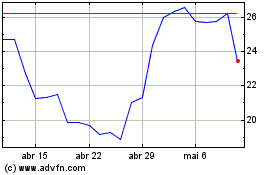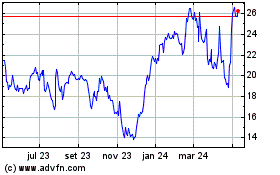AnaptysBio, Inc. (Nasdaq: ANAB), a clinical-stage biotechnology
company developing first-in-class antibody product candidates
focused on unmet medical needs in inflammation, today presented
updated proof-of-concept data for etokimab, its investigational
anti-IL-33 therapeutic antibody, in a single dose Phase 2a clinical
trial in adult patients with severe eosinophilic asthma, at the
2019 European Academy of Allergy and Clinical Immunology (EAACI)
Congress. The oral presentation, titled “Single-Dose Phase 2a Trial
of Etokimab (anti-IL-33) in Severe Eosinophilic Asthma”, was
presented by Dr. Marco Londei, AnaptysBio’s Chief Medical Officer,
and is available through the publications section of the AnaptysBio
website.
Patients in the etokimab arm rapidly improved their Forced
Exhaled Volume In One Second (FEV1), which is a measure of lung
function, with an eight percent FEV1 improvement over placebo at
Day 2, which was sustained through Day 64 with an 11 percent
increase over placebo. Asthma Control Questionnaire 5 (ACQ-5)
scores, which comprise patient-reported outcomes associated with
asthma symptoms, decreased in the etokimab arm by 0.52 over placebo
at Day 8 and were sustained to 0.54 over placebo at Day 64, and the
etokimab arm achieved the minimal clinically important difference
(MCID) of 0.5 below baseline. Blood eosinophil level reduction,
which is a biomarker of etokimab’s mechanism, demonstrated 31
percent and 46 percent reductions in the etokimab arm over placebo
at Days 2 and 64, respectively. Etokimab was generally well
tolerated in all patients and no serious adverse events were
reported. These data, taken together with prior Phase 2a atopic
dermatitis trial results, suggest that etokimab may enable
infrequent dosing across atopic diseases.
“The positive proof-of-concept data generated under this trial
are consistent with the genetically-validated rationale for
etokimab’s IL-33 inhibitory mechanism in eosinophilic asthma,”
said Hamza Suria, president and chief executive officer
of AnaptysBio. “We look forward to advancing etokimab in
multiple atopic disease indications, including moderate-to-severe
atopic dermatitis, chronic rhinosinusitis with nasal polyps and
severe eosinophilic asthma.”
Phase 2a Trial DesignThis Phase 2a
proof-of-concept trial enrolled 25 adult severe eosinophilic asthma
patients, who were randomized between a single 300mg intravenous
dose of etokimab or placebo upon enrollment (Day 1) at six sites
located in the United States and the United Kingdom. Upon
screening, which occurred seven to 14 days prior to enrollment,
patients were required to have a blood eosinophil count of at least
300 per microliter, confirmed clinical diagnosis of severe asthma
according to the Global Initiative for Asthma (GINA) 2016,
pre-bronchodilator FEV1 of less than 80 percent of predicted and at
least one asthma exacerbation within the past 12 months requiring
use of rescue medication. Patients were required to be stably
maintained on high-dose inhaled corticosteroids (ICS) and
long-acting beta-2-agonists (LABA) for at least three months prior
to screening and were required to continue ICS/LABA therapy during
the course of this trial. Patients were permitted to utilize
rescue therapy when medically necessary, including in the
management of asthma exacerbations. Baseline clinical
assessments were conducted for each patient on Day 1 prior to
etokimab or placebo dose, and patients completed follow-up clinical
assessments on Days 2, 8, 22, 36, 64, 85, 106 and 127.
Phase 2a Trial ResultsKey data and observations
indicate the following:
- Baseline parameters of etokimab-dosed patients (n=12) were 545
blood eosinophils per microliter, 2.5 liters FEV1, 65 percent
predicted FEV1 and ACQ-5 score of 2.25, while placebo-dosed
patients (n=13) had 705 blood eosinophils per microliter, 2.5
liters FEV1, 66 percent predicted FEV1 and ACQ-5 score of 1.88.
The average age of patients in the etokimab and placebo arms
were 41 and 36, respectively. Nine of 12 (75%) etokimab-dosed
patients were male, while nine of 13 (69%) placebo-dosed patients
were male.
- No exacerbations or rescue medication usage were reported
through Day 64. Post-Day 64, asthma exacerbations were reported in
one etokimab-dosed patient and two placebo-dosed patients. Rescue
therapy usage, including short-acting beta agonists and oral
corticosteroids, were reported in the management of each asthma
exacerbation occurrence.
- Patients in the etokimab arm rapidly improved lung function by
Day 2, where FEV1 increased by eight percent over placebo. FEV1
increase was sustained at Day 64, where the etokimab arm
demonstrated an 11 percent increase over placebo.
- ACQ-5 scores, which comprise patient reported asthma symptom
outcomes, decreased in the etokimab arm by 0.52 over placebo by Day
8 and were sustained to 0.54 over placebo at Day 64. The minimal
clinically important difference (MCID) of ACQ-5 is 0.5 relative to
baseline, which was achieved in the etokimab arm.
- Blood eosinophils were reduced by 31 percent in the etokimab
arm over placebo at Day 2 and sustained to 46 percent over placebo
at Day 64. This reduction is consistent with the blood eosinophil
changes observed in a prior etokimab Phase 2a trial in
moderate-to-severe atopic dermatitis patients.
- Etokimab was generally well-tolerated, and no
treatment-emergent adverse events were deemed to be
etokimab-related. No serious adverse events were reported during
this trial. The most frequent treatment-emergent adverse events
reported in the etokimab arm were moderate strep throat in two
patients. Placebo-dosed patients reported the most frequent
treatment-emergent adverse events as mild vomiting in two patients,
mild and moderate asthma exacerbations in two patients and mild
cough in two patients.
|
Parameter |
Timepoint |
Change Relative to |
|
|
Day 1 Baseline |
|
|
Etokimab(n=12) |
Placebo(n=13) |
Net |
|
|
FEV1 |
Day 2 |
12% |
4% |
8% |
|
|
Day 8 |
9% |
5% |
4% |
|
|
Day 22 |
16% |
8% |
8% |
|
|
Day 36 |
14% |
8% |
6% |
|
|
Day 64 |
15% |
4% |
11% |
|
|
Day 85 |
9% |
7% |
2% |
|
|
Day 106 |
11% |
11% |
0% |
|
|
Day 127 |
13% |
8% |
5% |
|
|
ACQ-5Score |
Day 8 |
-0.62 |
-0.09 |
-0.52 |
|
|
Day 22 |
-0.48 |
-0.25 |
-0.24 |
|
|
Day 36 |
-0.6 |
-0.12 |
-0.48 |
|
|
Day 64 |
-0.67 |
-0.12 |
-0.54 |
|
|
Day 85 |
-0.67 |
-0.18 |
-0.48 |
|
|
Day 106 |
-0.72 |
-0.44 |
-0.27 |
|
|
Day 127 |
-0.77 |
-0.36 |
-0.41 |
|
|
BloodEosinophilLevel |
Day 2 |
-22% |
9% |
-31% |
|
|
Day 8 |
-34% |
-15% |
-19% |
|
|
Day 22 |
-30% |
-10% |
-20% |
|
|
Day 36 |
-43% |
1% |
-44% |
|
|
Day 64 |
-40% |
6% |
-46% |
|
|
Day 85 |
-36% |
-7% |
-29% |
|
|
Day 106 |
-19% |
-13% |
-6% |
|
|
Day 127 |
-24% |
-16% |
-8% |
|
Phase 2b Trial AnaptysBio plans to initiate,
during 2019, a multi-dose Phase 2b randomized, double-blinded,
placebo-controlled trial in 300-400 moderate-to-severe eosinophilic
asthma patients, where multiple dose levels and dosing frequencies
will be assessed for key endpoints, including exacerbation
reduction, FEV1 and ACQ-5.
About EtokimabEtokimab, previously referred to
as ANB020, is an antibody that potently binds and inhibits the
activity of interleukin-33, or IL-33, a pro-inflammatory cytokine
that multiple studies have indicated is a central mediator of
atopic diseases, which AnaptysBio believes is broadly applicable to
the treatment of atopic inflammatory disorders, such as
moderate-to-severe atopic dermatitis, severe eosinophilic asthma,
chronic rhinosinusitis with nasal polyps (CRSwNP) and potentially
other allergic conditions. AnaptysBio is currently conducting
its ATLAS trial, a randomized, double-blinded, placebo-controlled
multi-dose Phase 2b clinical trial of etokimab in 300
moderate-to-severe adult atopic dermatitis patients where data is
anticipated in the second half of 2019. The Company is
also conducting its ECLIPSE trial, a randomized, double-blinded,
placebo-controlled Phase 2 trial of etokimab in approximately 100
adult patients with CRSwNP where data is anticipated in the second
half of 2019. AnaptysBio also plans to initiate, during 2019,
a randomized, double-blinded, placebo-controlled, multi-dose Phase
2b trial of etokimab in 300-400 patients with eosinophilic
asthma.
About AnaptysBioAnaptysBio is a clinical-stage
biotechnology company developing first-in-class antibody product
candidates focused on unmet medical needs in inflammation. The
Company’s proprietary anti-inflammatory pipeline includes its
anti-IL-33 antibody etokimab, previously referred to as ANB020, for
the treatment of moderate-to-severe atopic dermatitis, eosinophilic
asthma, and adult chronic rhinosinusitis with nasal polyps, or
CRSwNP; its anti-IL-36R antibody ANB019 for the treatment of rare
inflammatory diseases, including generalized pustular psoriasis, or
GPP, and palmoplantar pustulosis, or PPP, and novel
anti-inflammatory checkpoint receptor modulator antibodies for
treatment of certain autoimmune diseases where immune checkpoint
receptors are insufficiently activated. AnaptysBio’s antibody
pipeline has been developed using its proprietary somatic
hypermutation, or SHM, platform, which uses in vitro SHM for
antibody discovery and is designed to replicate key features of the
human immune system to overcome the limitations of competing
antibody discovery technologies. AnaptysBio has also developed
multiple therapeutic antibodies in an immuno-oncology partnership
with TESARO (recently acquired by GlaxoSmithKline), including an
anti-PD-1 antagonist antibody (dostarlimab, TSR-042), an anti-TIM-3
antagonist antibody (TSR-022) and an anti-LAG-3 antagonist antibody
(TSR-033), and an inflammation partnership with Celgene, including
an anti-PD-1 checkpoint agonist antibody (CC-90006) currently in
clinical development.
Forward-Looking Statements This press release
contains “forward-looking” statements within the meaning of the
“safe harbor” provisions of the Private Securities Litigation
Reform Act of 1995, including, but not limited to: the timing of
the release of data from our clinical trials, including etokimab’s
Phase 2b clinical trial in moderate-to-severe adult atopic
dermatitis patients and etokimab’s Phase 2 clinical trial in adult
patients with CRSwNP; our design of and our ability to launch a
Phase 2b clinical trial of etokimab in eosinophilic asthma;
statements regarding potential dosing frequency of etokimab; and
statements by AnaptysBio’s president and chief executive officer.
Statements including words such as “plan,” “continue,” “expect,” or
“ongoing” and statements in the future tense are forward-looking
statements. These forward-looking statements involve risks and
uncertainties, as well as assumptions, which, if they do not fully
materialize or prove incorrect, could cause our results to differ
materially from those expressed or implied by such forward-looking
statements. Forward-looking statements are subject to risks and
uncertainties that may cause the company’s actual activities or
results to differ significantly from those expressed in any
forward-looking statement, including risks and uncertainties
related to the company’s ability to advance its product candidates,
obtain regulatory approval of and ultimately commercialize its
product candidates, the timing and results of preclinical and
clinical trials, the company’s ability to fund development
activities and achieve development goals, the company’s ability to
protect intellectual property and other risks and uncertainties
described under the heading “Risk Factors” in documents the company
files from time to time with the Securities and Exchange
Commission. These forward-looking statements speak only as of the
date of this press release, and the company undertakes no
obligation to revise or update any forward-looking statements to
reflect events or circumstances after the date hereof.
Contacts:Dominic Piscitelli
AnapytsBio, Inc. 858.362.6348 dpiscitelli@anaptysbio.com
AnaptysBio (NASDAQ:ANAB)
Gráfico Histórico do Ativo
De Mar 2024 até Abr 2024

AnaptysBio (NASDAQ:ANAB)
Gráfico Histórico do Ativo
De Abr 2023 até Abr 2024
